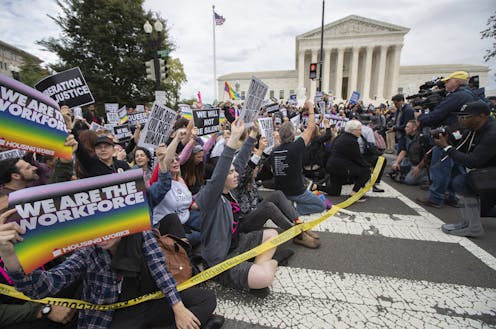Nondiscrimination against LGBT individuals isn't just the law – it helps organizations succeed
- Written by George B. Cunningham, Professor of Sport Management and Sr. Assistant Provost for Graduate and Professional Studies, Texas A&M University

The Supreme Court ruled[1] on June 15 that an employer who fires an individual for being gay or transgender violates Title VII of the Civil Rights Act of 1964[2]. In other words, discrimination against lesbian, gay, bisexual and transgender individuals is now forbidden under federal law.
As someone who supports LGBT rights, I believe it’s a big step forward, one that I hope compels companies that continue to discriminate[3] to change their ways.
But, as research by myself and others shows, there was already a powerful reason to do so: More inclusive workplaces tend to perform better than those that aren’t.
Creating inclusiveness
How can organizations be more inclusive?
Based on my research[4] in diversity in sports organizations[5], which spans 20 years, I believe a good start is putting strong policies in place that make it clear that discrimination based on one’s sexual orientation is always inappropriate.
This also means[6] regular education and training on these policies, which helps encourage more interpersonal interactions around the issue and challenging discussions that force people to confront their own prejudices.
Leaders[7] also play a key role, as they model what inclusiveness looks like and hold people accountable for their actions.
Inclusive workplaces also tend to instill this spirit throughout the organization, from its mission statement to how it conducts employee evaluations.
A path to success
In a 2019 study[8], a colleague and I examined LGBT inclusion at 65 of the biggest university athletic departments in the U.S. and compared it with how well their teams performed in the gym or on the field.
We measured inclusion[9] by looking at factors like department nondiscrimination policies, the existence of LGBT-focused resources and a fan code of conduct that explicitly prohibits homophobic, transphobic and sexist behavior. We measured performance with team wins and losses[10].
We found that as LGBT inclusiveness increased, so too did the overall success[11] of the school’s teams.
The benefits were especially positive when the state in which the university was located had a high number of sexual minority residents[12] and low levels of bias toward LGBT[13] individuals.
Equally important was what we did not find. Specifically, LGBT inclusion did not hurt performance when the state didn’t have a large gay population or when bias was high. Put another way, there were only positives – and no negatives – associated with having an inclusive workplace.
These findings are consistent with our previous sports-related empirical work[14], experimental studies[15] and in-depth case studies[16].
Inclusion beyond sport
This connection between work environments that are supportive and welcoming to LGBT individuals and better performance isn’t limited to sport organizations.
Researchers in human resource management[17], business ethics[18] and organizational psychology[19] have all come to similar conclusions.
For example, in a study of thousands of companies, researchers[20] found that LGBT inclusion also correlates with employee productivity, profitability and business performance. Other research has shown companies recognized for their inclusive efforts see higher stock prices[21] as well as more success in recruitment and retention[22].
And, naturally, LGBT people working in inclusive workplaces experience less discrimination and prejudice[23], making it easier for them to be authentic[24] at work, which helps improve psychological well-being[25].
So although the Supreme Court has finally and firmly banned LBGT discrimination, companies that have already embraced more inclusive workplaces have long been reaping the benefits.
[Expertise in your inbox. Sign up for The Conversation’s newsletter and get a digest of academic takes on today’s news, every day.[26]]
References
- ^ ruled (www.supremecourt.gov)
- ^ Title VII of the Civil Rights Act of 1964 (www.eeoc.gov)
- ^ companies that continue to discriminate (www.usatoday.com)
- ^ research (scholar.google.com)
- ^ sports organizations (www.routledge.com)
- ^ This also means (doi.org)
- ^ Leaders (www.researchgate.net)
- ^ 2019 study (doi.org)
- ^ measured inclusion (www.athleteally.org)
- ^ team wins and losses (thedirectorscup.com)
- ^ overall success (thedirectorscup.com)
- ^ high number of sexual minority residents (www.lgbtmap.org)
- ^ bias toward LGBT (osf.io)
- ^ empirical work (doi.org)
- ^ experimental studies (www.researchgate.net)
- ^ in-depth case studies (doi.org)
- ^ human resource management (www.doi.org)
- ^ business ethics (www.doi.org)
- ^ organizational psychology (www.cambridge.org)
- ^ researchers (www.doi.org)
- ^ stock prices (www.doi.org)
- ^ recruitment and retention (www.doi.org)
- ^ discrimination and prejudice (www.doi.org)
- ^ authentic (www.emerald.com)
- ^ psychological well-being (www.doi.org)
- ^ Expertise in your inbox. Sign up for The Conversation’s newsletter and get a digest of academic takes on today’s news, every day. (theconversation.com)
Authors: George B. Cunningham, Professor of Sport Management and Sr. Assistant Provost for Graduate and Professional Studies, Texas A&M University

